Related Research Articles
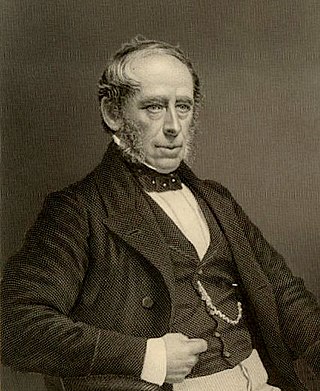
John Somerset Pakington, 1st Baron Hampton,, known as Sir John Pakington, Bt, from 1846 to 1874, was a British Conservative politician.

Sir Rupert Iain Kay Moncreiffe of that Ilk, 11th Baronet, Chief of Clan Moncreiffe, was a British Officer of Arms and genealogist.
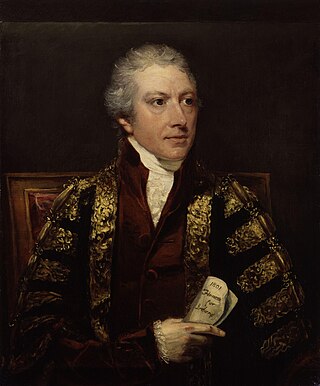
Charles Abbot, 1st Baron Colchester PC, FRS was a British barrister and statesman. He served as Speaker of the House of Commons between 1802 and 1817.
William Wilkins was an English architect, classical scholar and archaeologist. He designed the National Gallery and University College London, and buildings for several Cambridge colleges.
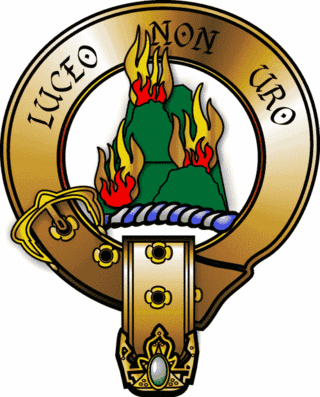
Clan Mackenzie is a Scottish clan, traditionally associated with Kintail and lands in Ross-shire in the Scottish Highlands. Traditional genealogies trace the ancestors of the Mackenzie chiefs to the 12th century. However, the earliest Mackenzie chief recorded by contemporary evidence is Alexander Mackenzie of Kintail who died some time after 1471. Traditionally, during the Wars of Scottish Independence, the Mackenzies supported Robert the Bruce, but feuded with the Earls of Ross in the latter part of the 14th century. During the 15th and 16th-centuries the Mackenzies feuded with the neighboring clans of Munro and MacDonald. In the 17th century the Mackenzie chief was made Earl of Seaforth in the peerage of Scotland. During the Scottish Civil War of the 17th century the Mackenzies largely supported the Royalists. During the Jacobite rising of 1715 the chief and clan of Mackenzie supported the Jacobite cause. However, during the Jacobite rising of 1745 the clan was divided with the chief, Kenneth Mackenzie, Lord Fortrose, supporting the British-Hanoverian Government and his relative, George Mackenzie, 3rd Earl of Cromartie, supporting the Jacobites.

Clan MacDonnell of Glengarry is a Scottish clan and is a branch of the larger Clan Donald. The clan takes its name from Glen Garry where the river Garry runs eastwards through Loch Garry to join the Great Glen about 16 miles (25 km) north of Fort William, Highland.

Clan Brodie is a Scottish clan whose origins are uncertain. The first known Brodie chiefs were the Thanes of Brodie and Dyke in Morayshire. The Brodies were present in several clan conflicts, and during the civil war were ardent covenanters. They resisted involvement in the Jacobite uprisings, and the chief's family later prospered under the British Empire in colonial India.

Beauly is a village in the Highland area, on the River Beauly, 5 miles (8 km) west of Inverness by the Far North railway line. The town is historically within Kilmorack Parish of the Scottish County of Inverness.

Admiral Norwich Duff FRSE was a Royal Navy officer.

The Valliscaulian Order was a religious order of the Catholic Church. It was named after Vallis Caulium or Val-des-Choux, its first monastery, located in Burgundy. The order was founded at the end of the twelfth century and lasted until its absorption by the Cistercians in the eighteenth century.

Beauly Priory was a Valliscaulian monastic community located at "Insula de Achenbady", now Beauly, Inverness-shire. It was probably founded in 1230. It is not known for certain who the founder was, different sources giving Alexander II of Scotland, John Byset, and both. The French monks, along with Bisset, had a strong enough French-speaking presence to give the location and the river the name "beau lieu" and have it pass into English.
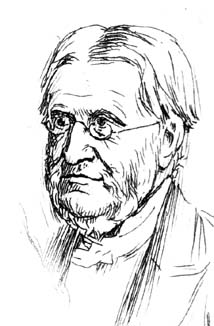
Philip KellandPRSE FRS was an English mathematician. He was known mainly for his great influence on the development of education in Scotland.
Edmund Hobhouse was the English-born bishop of Nelson, New Zealand, and an antiquary.
Hon David Douglas, Lord Reston FRSE was a Scottish judge and a cousin and the heir of Adam Smith.
Edmund Colthurst was a wealthy English landowner who inherited the former monastic estates of Hinton Priory and Bath Abbey, Somerset, following the death of his father in 1559. He was the son of Matthew Colthurst and Anne Grimston. He married Elinor de la Rivere, daughter of Thomas de la Rivere, with whom he had eight children.
John Byset the Elder, Lord of the Aird was a Scoto-Norman nobleman who is the progenitor of the Bissett family of the Glens of Antrim in medieval northeastern Ireland, present-day Northern Ireland.

The Battle of Glen Affric took place in 1721 in Glen Affric, in the Scottish Highlands. It was fought between Government backed forces of the Clan Ross against rebel the forces of the Clan Mackenzie and their allies the Clan Macrae.
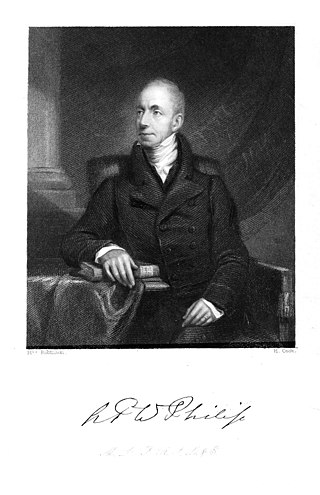
Alexander Philips Wilson Philip FRS FRSE was a Scottish physician, physiologist and medical author. He conducted experimental studies on animal and human physiology particularly dealing with digestion, circulation, and the nervous system. He is thought to have gone bankrupt and fled to France where he died in obscurity.
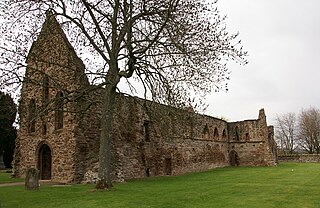
The dispute over the lands of Beauly Priory took place in about 1577-78 in Beauly, Inverness-shire, Scottish Highlands. It was contested between Colin Cam Mackenzie, 11th of Kintail, chief of Clan Mackenzie and Thomas Fraser of Knockie who was the tutor to the young Simon Fraser, 6th Lord Lovat, chief of the Clan Fraser of Lovat. Fraser was supported by Robert Mor Munro, 15th Baron of Foulis.
References
- 1 2 "Person Page".
- ↑ "The Sherborne Register 1550-1950" (PDF). Old Shirbirnian Society. Retrieved 16 February 2019.
- ↑ "Edmund Chisholm Batten". Proceedings of the Royal Society of Edinburgh. 22: iii–iv. 1899. doi: 10.1017/S0370164600051658 .
- ↑ C D Waterston; A Macmillan Shearer (July 2006). Former Fellows of The Royal Society of Edinburgh, 1783–2002: Part 1 (A–J) (PDF). Royal Society of Edinburgh. ISBN 090219884X. Archived from the original (PDF) on 24 January 2013. Retrieved 18 September 2015.